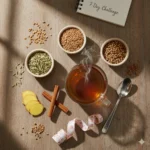Sip Your Way to Better Blood Sugar? The Health Morph Guide to Herbal Teas for Diabetes Support
Best herbal tea for diabetes – If you’re looking for a natural and effective way to manage blood sugar levels, herbal teas can be a game-changer. This article explores powerful, science-backed herbal teas that support diabetes management daily.
Managing diabetes is a daily commitment that touches every aspect of your life. From carefully monitoring what you eat to maintaining consistent exercise routines and adhering to medication schedules, the journey can feel overwhelming. While diet, exercise, and prescribed medications remain the cornerstone of diabetes management, many people seek additional natural strategies to support their blood sugar control. This search for complementary approaches is both understandable and valuable when pursued safely.
Herbal teas, when enjoyed unsweetened, offer more than just a comforting ritual or hydration. These aromatic beverages contain bioactive compounds that may provide gentle support for blood sugar management. However, before we explore this fascinating intersection of traditional wisdom and modern science, it’s crucial to understand one fundamental truth: herbal teas are complementary tools, not replacements for prescribed medical treatment or healthy lifestyle choices. Always consult your healthcare provider before incorporating any new herbal remedies into your diabetes management plan.
Welcome to Health Morph, where we believe in empowering you with evidence-based information to make informed decisions about your health. In this comprehensive guide, we’ll explore why certain herbal teas might benefit those with diabetes, dive deep into specific teas backed by research, address important safety considerations, and provide practical advice for safely integrating these natural allies into your daily routine.
You’ll discover the mechanisms behind how these teas might work, detailed profiles of seven promising herbal options, common misconceptions to avoid, and strategies for making safe, effective choices. By the end of this article, you’ll be equipped with the knowledge to explore these natural options responsibly while maintaining the medical oversight essential for optimal diabetes management.

Why Herbal Teas for Diabetes? Understanding the Mechanisms
The appeal of herbal teas for diabetes support extends far beyond their ability to replace sugary beverages. These aromatic infusions contain a complex array of bioactive compounds, including polyphenols, flavonoids, and antioxidants, which may offer several mechanisms of support for blood sugar management.
Improving Insulin Sensitivity is perhaps the most significant potential benefit. Many herbal compounds may help cells respond more effectively to insulin, allowing for better glucose uptake and utilization. This improved sensitivity can lead to more stable blood sugar levels and reduced strain on the pancreas.
Reducing Oxidative Stress and Inflammation represents another crucial mechanism. Chronic inflammation and oxidative stress are hallmarks of diabetes that can worsen insulin resistance over time. The antioxidant properties of many herbal teas may help combat these destructive processes, potentially supporting overall metabolic health.
Some herbal teas may also help with slowing glucose absorption after meals. Certain compounds and fibers can interfere with carbohydrate digestion or glucose absorption in the intestines, leading to more gradual post-meal blood sugar rises rather than sharp spikes.
Supporting Pancreatic Health is another potential benefit. Some herbs contain compounds that may help protect the insulin-producing beta cells in the pancreas, though more research is needed to fully understand these mechanisms.
The indirect benefits of herbal teas shouldn’t be overlooked either. Many herbal teas promote relaxation and stress reduction, which is crucial since stress hormones can significantly impact blood sugar levels. Some teas may also improve sleep quality and digestive function, both of which play important roles in metabolic health.
Finally, there’s the unsweetened advantage. As naturally low-calorie, sugar-free beverages, herbal teas are inherently better choices than sugary drinks for anyone managing diabetes. This simple substitution alone can make a meaningful difference in daily blood sugar management.
Top Herbal Teas for Diabetes Support: Evidence-Based Deep Dive
Green Tea
While technically derived from the Camellia sinensis plant rather than being a true herbal tea, green tea deserves inclusion due to its exceptional benefits for blood sugar management. Green tea is rich in catechins, particularly epigallocatechi gallate (EGCG), which has been extensively studied for its metabolic effects.
Why It Works (The Science/Potential Benefits): Multiple studies have shown that green tea consumption may improve insulin sensitivity and glucose metabolism. A 2013 systematic review found that green tea consumption was associated with reduced fasting glucose and HbA1c levels. The catechins in green tea may work by enhancing insulin receptor sensitivity and improving glucose uptake by muscle cells. Additionally, green tea’s anti-inflammatory properties may help reduce the chronic inflammation associated with insulin resistance.
How to Consume: Brew 1-2 cups of green tea daily using water at about 175°F (79°C) to preserve the delicate catechins. Steep for 2-3 minutes. The best times to drink green tea are between meals or 30 minutes after eating to potentially help with post-meal glucose control.
Important Considerations/Cautions: Green tea contains caffeine, which may not be suitable for everyone, particularly those sensitive to stimulants or those with certain heart conditions. It can also interfere with iron absorption when consumed with meals. If you’re taking blood-thinning medications, consult your doctor, as green tea may enhance their effects.
Cinnamon Tea
Cinnamon tea, made from steeping cinnamon bark or using cinnamon sticks, has gained significant attention for its potential blood sugar benefits. It’s important to distinguish between Ceylon cinnamon (considered safer for regular consumption) and Cassia cinnamon (which contains higher levels of coumarin and may cause liver issues with excessive consumption).
Why It Works (The Science/Potential Benefits): Several studies have investigated cinnamon’s impact on blood sugar control. A 2013 meta-analysis found that cinnamon supplementation may lead to modest improvements in fasting glucose and HbA1c levels. The active compounds in cinnamon, including cinnamaldehyde and proanthocyanidins, may enhance insulin sensitivity and slow gastric emptying, leading to more gradual glucose absorption.
How to Consume: Use one cinnamon stick per cup of hot water or 1/2 teaspoon of Ceylon cinnamon powder. Steep for 5-10 minutes. Drink 1-2 cups daily, ideally with meals to potentially help with post-meal glucose management.
Important Considerations/Cautions: Stick to Ceylon cinnamon for regular consumption to avoid excessive coumarin intake. Those with liver conditions should be particularly cautious. Cinnamon may interact with diabetes medications to cause hypoglycemia, so close monitoring is essential.
Fenugreek Tea
Fenugreek seeds have been used in traditional medicine for centuries and are particularly relevant for diabetes management. This herb is rich in soluble fiber and contains compounds that may directly impact glucose metabolism.
Why It Works (The Science/Potential Benefits): Fenugreek contains 4-hydroxyisoleucine, an amino acid that may stimulate insulin secretion in a glucose-dependent manner. The high fiber content can slow carbohydrate digestion and glucose absorption. A 2011 study found that fenugreek seed extract improved glucose tolerance and reduced fasting glucose levels in people with type 2 diabetes.
How to Consume: Soak 1-2 teaspoons of fenugreek seeds in hot water for 10-15 minutes, then strain. You can also use fenugreek powder. Drink 1-2 cups daily, preferably before meals to potentially help with post-meal glucose control.
Important Considerations/Cautions: Fenugreek may cause hypoglycemia when combined with diabetes medications. It can also cause digestive upset in some people. Those with thyroid conditions should consult their doctor, as fenugreek may interfere with thyroid function.
Chamomile Tea
Chamomile is best known for its calming properties, but research suggests it may also offer benefits for blood sugar management. This gentle herb contains apigenin and other flavonoids that may have metabolic effects.
Why It Works (The Science/Potential Benefits): A 2008 study found that chamomile extract improved glucose control and reduced oxidative stress in diabetic rats. In humans, a small 2017 study showed that chamomile tea consumption was associated with improved markers of glycemic control. The anti-inflammatory properties of chamomile may help reduce the chronic inflammation associated with insulin resistance.
How to Consume: Use 1-2 teaspoons of dried chamomile flowers or one tea bag per cup of hot water. Steep for 5-10 minutes. Drink 1-3 cups daily, with the last cup in the evening to potentially benefit from both metabolic and relaxation effects.
Important Considerations/Cautions: Chamomile is generally safe for most people, but those with allergies to ragweed, chrysanthemums, or daisies should avoid it. It may interact with blood-thinning medications and can cause drowsiness in some individuals.
Hibiscus Tea
Hibiscus tea, made from dried hibiscus flowers, is rich in antioxidants and has been studied for its potential cardiovascular and metabolic benefits. The deep red color comes from anthocyanins, powerful antioxidant compounds.
Why It Works (The Science/Potential Benefits): Research suggests that hibiscus may help improve insulin sensitivity and reduce oxidative stress. A 2013 study found that hibiscus extract helped lower blood glucose levels in diabetic rats. The anthocyanins in hibiscus may also support cardiovascular health, which is particularly important for people with diabetes who have increased cardiovascular risk.
How to Consume: Use 1-2 teaspoons of dried hibiscus flowers per cup of hot water. Steep for 5-10 minutes. The tea can be enjoyed hot or cold. Drink 1-2 cups daily, but avoid consuming it with meals as it may interfere with iron absorption.
Important Considerations/Cautions: Hibiscus may lower blood pressure, so those with hypotension should be cautious. It can also interact with certain medications, including some diuretics and blood pressure medications. Some people may experience stomach upset with higher doses.
Ginger Tea
Ginger has been used medicinally for thousands of years and contains bioactive compounds like gingerol and shogaol that may offer metabolic benefits. Fresh ginger root makes a warming, spicy tea that’s both delicious and potentially beneficial.
Why It Works (The Science/Potential Benefits): Studies suggest that ginger may help improve fasting glucose levels and HbA1c. A 2015 study found that ginger supplementation significantly reduced fasting blood glucose and HbA1c in people with type 2 diabetes. Ginger’s anti-inflammatory properties may help reduce the chronic inflammation associated with insulin resistance.
How to Consume: Use 1-2 inches of fresh ginger root, sliced or grated, per cup of hot water. Steep for 5-10 minutes. You can also use 1 teaspoon of dried ginger powder. Drink 1-2 cups daily, preferably between meals.
Important Considerations/Cautions: Ginger can interact with blood-thinning medications and may cause heartburn in some people. High doses may cause nausea or stomach upset. Those with gallstones should avoid ginger, as it may increase bile production.
Turmeric Tea
Turmeric, the golden spice that gives curry its distinctive color, contains curcumin, a powerful anti-inflammatory compound. Turmeric tea has gained popularity for its potential health benefits, including blood sugar support.
Why It Works (The Science/Potential Benefits): Curcumin has been shown to improve insulin sensitivity and reduce glucose production in the liver. A 2013 study found that curcumin supplementation improved glucose tolerance and reduced fasting glucose levels. The anti-inflammatory properties of curcumin may help address the chronic inflammation that contributes to insulin resistance.
How to Consume: Use 1 teaspoon of turmeric powder per cup of hot water, or simmer fresh turmeric root for 10-15 minutes. Adding a pinch of black pepper can enhance curcumin absorption. Drink 1-2 cups daily, preferably with meals to improve absorption.
Important Considerations/Cautions: Turmeric may interact with blood-thinning medications and can increase the risk of bleeding. It may also interfere with chemotherapy treatments. Those with gallstones or bile duct obstruction should avoid turmeric.
What to Avoid & Common Misconceptions
When exploring herbal teas for diabetes support, it’s crucial to understand what to avoid and recognize common misconceptions that could undermine your efforts or even pose health risks.
Sugary or Sweetened Teas completely defeat the purpose of using herbal teas for blood sugar management. Adding sugar, honey, jaggery, or artificial sweeteners (which may still trigger insulin responses) can negate any potential benefits. If you find a tea too bitter, try mixing it with a milder herb like chamomile or adding a slice of lemon.
“Miracle Cure” Claims should be approached with extreme skepticism. No herbal tea can cure diabetes or replace proper medical treatment. Products marketed as “diabetes reversal teas” or promising rapid blood sugar normalization are often scams that prey on people’s desperation for easy solutions.
Overdosing on Herbal Teas can be dangerous. The principle that “more is better” doesn’t apply to herbal remedies. Some compounds can become toxic at high doses, and concentrated herbal extracts can be particularly risky. Stick to recommended serving sizes and consult your healthcare provider before taking any herbal supplements.
Untested Proprietary Blends should be approached with caution. Some companies market “diabetes tea” blends containing multiple herbs without disclosing exact quantities or potential interactions. These products may contain unpredictable combinations that could interact dangerously with medications or cause adverse effects.
Replacing Prescribed Medications with herbal teas is dangerous and potentially life-threatening. Diabetes medications are precisely calibrated to your specific needs, and stopping or reducing them without medical supervision can lead to serious complications.

Making Safe & Effective Choices for Your Health Morph Journey
The key to safely incorporating herbal teas into your diabetes management routine lies in careful, systematic approach guided by medical supervision and careful self-monitoring.
Always Consult Your Doctor First is the golden rule, especially if you’re taking any medications. This is not merely a suggestion but an absolute necessity. Your healthcare provider understands your specific condition, medications, and health history, and can advise you on potential interactions or risks.
Start Slow and Monitor your response carefully. Introduce one new tea at a time, starting with small amounts and gradually increasing as tolerated. Keep detailed records of your blood sugar readings, noting any changes in patterns after introducing a new tea. This systematic approach helps identify which teas work best for you and allows for early detection of any adverse effects.
Quality and Sourcing matter significantly when choosing herbal teas. Opt for organic, pesticide-free teas from reputable suppliers. Look for third-party testing or certifications that verify purity and potency. Avoid products with added fillers, artificial flavors, or other unnecessary ingredients.
Diet and Lifestyle Remain King in diabetes management. Herbal teas should complement, not replace, the fundamental principles of healthy eating, regular physical activity, stress management, and adequate sleep. These teas work best when integrated into a comprehensive approach to diabetes care.
Listen to Your Body and remain attuned to how you feel. While monitoring blood sugar levels is important, also pay attention to energy levels, digestion, sleep quality, and overall well-being. If you experience any unusual symptoms, discontinue the tea and consult your healthcare provider.
Conclusion
Herbal teas offer a promising avenue for natural support in blood sugar management when used wisely and safely. From green tea’s well-researched catechins to cinnamon’s insulin-sensitizing properties, these natural remedies can provide gentle, complementary support to traditional diabetes management approaches. However, their true value lies not in replacing medical treatment but in enhancing a comprehensive strategy that includes proper nutrition, regular exercise, stress management, and appropriate medical care.
The key to success lies in approaching these natural remedies with the same thoughtfulness and caution you would apply to any aspect of your health. By working closely with your healthcare provider, starting slowly, monitoring your response, and maintaining realistic expectations, you can safely explore how these time-tested remedies might support your journey toward better blood sugar control.
Ready to truly optimize your diabetes management with a holistic approach? At Health Morph, we provide evidence-based insights, actionable lifestyle strategies, and the comprehensive information you need to transform your health.
Don’t just manage – thrive! Explore more expert guides, personalized wellness plans, and our supportive community resources at Health Morph. Your journey to balanced blood sugar and a healthier life starts here!
We encourage you to share your experiences with herbal teas in the comments below, keeping in mind that individual responses can vary greatly. Share this article with others who might benefit from this information, and remember that while we can share experiences, we cannot provide medical advice.
The path to optimal health lies in integrating natural wisdom with modern science, creating a personalized approach that honors both the time-tested knowledge of traditional medicine and the rigorous standards of contemporary healthcare. With the right guidance and commitment to safe practices, herbal teas can become valuable allies in your journey toward better blood sugar management and overall wellness.
This article is for educational purposes only and is not intended to replace professional medical advice. Always consult with your healthcare provider before making changes to your diabetes management plan.






Leave a Reply